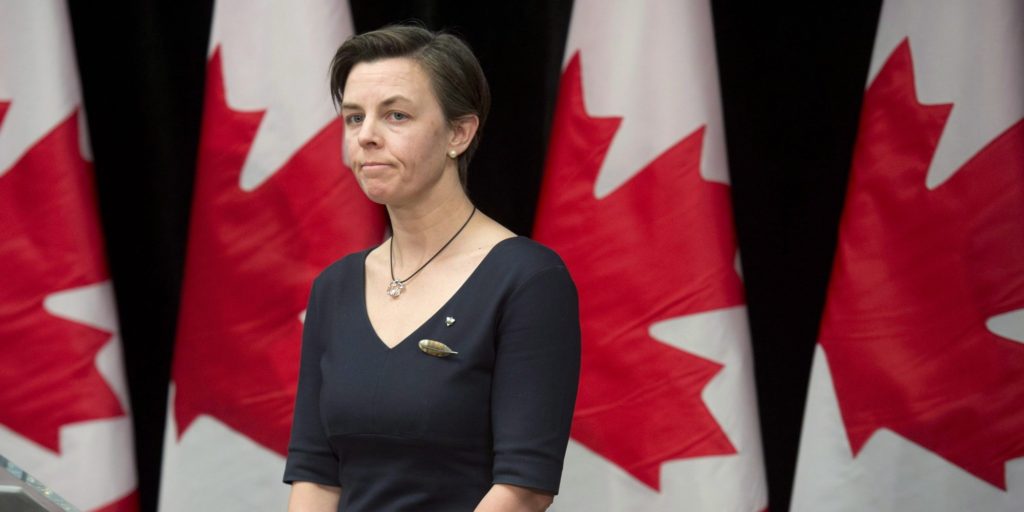By Jonathon Van Maren
Judging by the comments in my Facebook feed, Conservative Party leadership hopeful Kellie Leitch’s suggestion that we force immigrants to agree to a set of “Canadian values” before permitting them to come to Canada is quite popular among quite a few conservative Christians. On the face of it, this makes sense: when immigrants hailing from cultures that genuinely oppress women, engage in female genital mutilation, and believe that terrorist violence can be religiously justified take such values along with them to Canada, people have good reasons for fear and distaste. The sharp rise in sporadic terrorist violence in a number of European countries has also set many people on edge, and terror—as the word itself suggests—has a way of making people react instinctively and viscerally rather than rationally.
I’ve said this before, and I’ll say it again: the problem with such policies is that they force us to answer a question that no one has quite been able to answer yet. What are Western values today, anyways? To most of the world, “Western values” are showcased by our films and television shows, our music, our porn, and our relentless promotion of alternative sexual lifestyles and abortion. Try traveling anywhere outside the West and asking people what our “values” are. I can tell you one thing, nothing remotely Christian will characterize their response. So when Christians come out in support of such initiatives, I have to conclude that either one of two things are taking place: Either they’ve decided that Islamic terror is such a threat that teaming up with secular progressives to create dangerous loyalty oaths is worth the risk, or they haven’t yet realized that we haven’t lived in a Christian nation, or even one that respects Christian values, for quite some time now.
What many Christians don’t seem to yet understand is that even when loyalty oaths or other legislative action against behaviors that don’t seem to jive with Western culture seem to only be targeting those bringing certain attitudes with them from—let’s be honest here—Muslim countries, Christian values, too, are now considered radical and retrograde by most secular progressives. These laws and loyalty oaths, as such, will end up being applied to Christians, as well. Just as when I warned the burkini ban in Nice, France, would also be applied to religious garb such as the nun’s habit only to have the mayor of Nice confirm that it did, Kellie Leitch isn’t sure how her loyalty oaths would impact those holding to the Christian worldview, either. CTV journalist Evan Solomon asked her this question directly on his Sunday morning show:
“Let’s get specific there, let’s say someone comes and they want to become a citizen and they’re Catholic. And they say ‘do you believe in same-sex marriage’? And they say ‘no, I don’t’. Do they get in? Or do they now have an ‘anti-Canadian value’?”
With a grimace, Leitch promptly dodged the question:
“I think this is a discussion Canadians want to have. And for myself, there are certain values.”
Solomon pressed further, highlighting quite accurately that her loyalty oath would apply to many groups of people that she presumably did not intend it for:
“I’m trying to get you on something specific … I’m just wondering if this is a solution without a problem? For example, would a Catholic person who doesn’t believe in same-sex marriage, which is law here – would they fail this test? Would an Orthodox Jewish person who believes that a woman needs her head covered by a wig – would they fail this test? That’s the reality of what this values test would be. On those particular cases, would they past the test?”
And again, Leitch refused to answer, presumably realizing that if she mentioned specific practices and beliefs of certain strains of Islam, she would be violating “diversity”:
“I’m not going to go point-by-point, issue-by-issue and trivialize this issue.”
Solomon is precisely right to highlight why loyalty oaths are such a problem, and why the entire idea of “Canadian values” is such a fluid one. Is same-sex marriage a “Canadian value”? Then count me out. Is abortion a “Canadian value”? Then I reject such values in the most emphatic possible way. How about state-enforced and state-school delivered sex education? No, thank you. So does that make me un-Canadian? Does that place me out of step with so-called “Canadian values”? Would I pass Leitch’s loyalty oath? Would my Christian grandparents have passed it when they arrived at Pier 21 in Halifax from the Netherlands in 1953? These are questions that Leitch should have had answers to before putting forward her proposal.
We are not the only country trying to grapple with these questions. As the West has become post-Christian while simultaneously abandoning the practice of bearing children, an enormous influx of immigrants from other countries has put us in quite the conundrum. Much of the West has not only rejected Christianity, but become openly hostile towards it. However, when faced with the question of what to do about immigrants who do not respect—and even openly reject—Western traditions, we suddenly come to the uncomfortable realization that we have gotten rid of Judeo-Christian values without really bothering to replace them with anything else. “Secularism” hasn’t given us a new value system, but rather, as Peter Hitchens pointed out in a similar debate on the topic of “British values,” “turned us into a spiritual desert.”
In the British debate grappling with the same topic of “values” that we are now currently debating in Canada, Peter Hitchens makes a number of compelling and prescient points. “Extremism is a word that means nothing but an ‘opinion currently out of fashion,’” he pointed out. Further, Hitchens noted accurately, it isn’t just Muslims who find much of what passes as “Western values” today reprehensible—so does he, and so does many Christians:
“Many of the views which I hold, that frankly when my parents held them were commonplace, but when I hold them they are deemed to be eccentric and outrageous by a lot of people, are increasingly classified as extremist by the mainstream. How long is it before the classification of someone’s ideas as extremism leads to restrictions on freedom of speech? I disagree immensely with a lot of things that Muslims think and say, I think there are many disputes and many disagreements I have with their faith but I think that they should be free to express [their views] not least so that we can know what they are.”
I’d encourage you to watch the entire British debate, because it highlights the fact that the West has not yet figured out how to respond to influxes of immigrants with anti-Western values because we no longer know what Western values are to begin with. Christians especially should be extremely cautious about supporting proposals such as Leitch’s loyalty oath, because rather than shielding us from the dangerous worldviews prevalent in some countries, it places us firmly in between the pincers of secular totalitarianism and radical Islamism, and that is not a place we want to be. I think many Christians would be shocked to find out that such a loyalty oath could be used to bar Christian refugees from countries where persecution rages just as fast as it could be applied to Muslim fundamentalists seeking to escape violence in Syria and Iraq. We will all be collectively struggling with these complex issues in the years to come, but Kellie Leitch’s short-sighted and dangerous attempt to solve them should be emphatically rejected.








